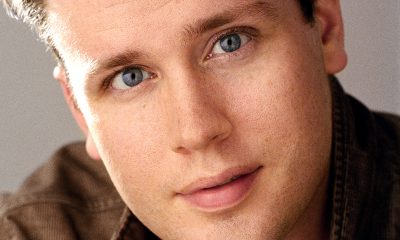a&e features
Michael Tilson Thomas Q&A
The out conductor on his long career in classical music
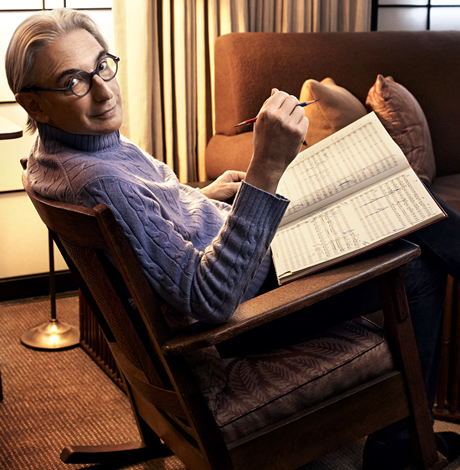
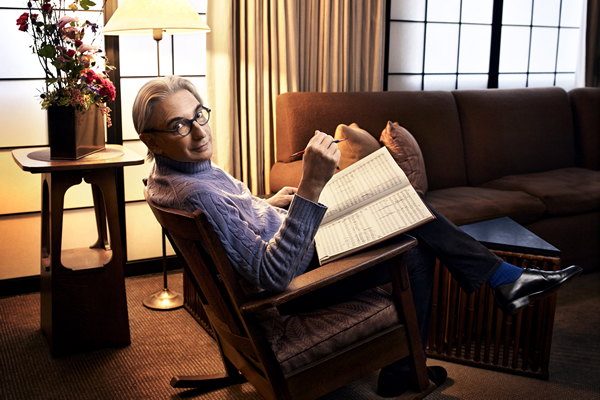
Michael Tilson Thomas says the public ultimately decides what works are retained in the classical canon.
Washington Performing Arts presents the San Francisco Symphony
Kennedy Center Concert Hall
Saturday, April 16
4 p.m.
$55
Though just four performances, the San Francisco Symphony’s current East Coast mini-tour features two programs.
The symphony will perform on Saturday, April 16 at 4 p.m. at the Kennedy Center Concert Hall performing Franz Schubert’s Symphony No. 8 “Unfinished” and Gustav Mahler’s “Das Lied von der Erde.” The players will be joined by mezzo-soprano Sasha Cooke and tenor Simon O’Neill. Two days prior, they’ll perform the same program at Carnegie Hall. The symphony will explore works by Copland and Schumann at the New Jersey Performing Arts Center this weekend.
We caught up with Music Director Michael Tilson Thomas, now in his 21st season with the symphony with whom he’s shared 12 Grammys, by phone this week. His comments have been slightly edited for length.
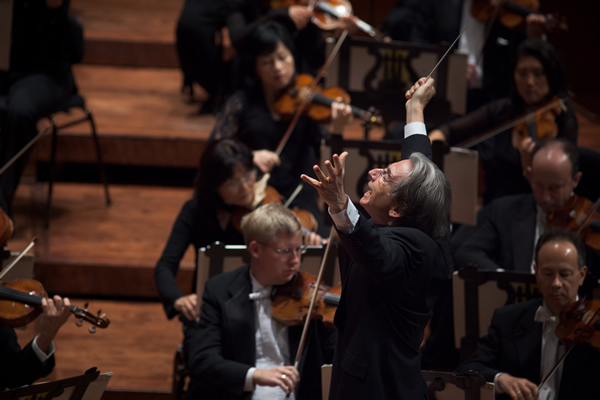
Michael Tilson Thomas, music director of the San Francisco Symphony, says managing an orchestra like a business is a mistake. (Photo by Bill Swerbenski; courtesy San Francisco Symphony)
WASHINGTON BLADE: You’ve recorded many Mahler symphonies. What is it about his music that continues to resonate with you?
MICHAEL TILSON-THOMAS: His music is very central to my whole view of life and that was evident from the first time I heard his music when I was around 13. This piece in fact, which we’re about to play in Washington, “Das Lied von der Erde,” I heard the last movement, the farewell, called “Der Abschied,” and it was stunning, a shock to me to hear music which so completely described the shape of my own soul and what I felt to be my parents’ souls, where all the kind of aching questions about the meaning of life and all sorts of questions which I hadn’t even consciously formed, but somehow I just knew this was a testimony that meant so much to me. Part of that was the musical presentation of situations where there can be bitterness or frustration or conflict, but nonetheless there’s still an element of beauteousness as well. For me, the message of the music is to hold on to the beauteousness at whatever the cost. That resonated with me from the first moment and still does.
BLADE: Does the Schubert symphony you’re also performing contrast with or complement the Mahler?
TILSON-THOMAS: Schubert (was) … using this sort of haunted language that was very Czech-influenced because his parents came from what is now the Czech Republic and of course Mahler did as well, so there is this sort of major/minor haunted harmonic language that’s part of it. … On the piano you have a note which you sometimes call E flat or sometimes you call it D sharp. On the piano, it’s the same note, but in orchestral music, these two notes are actually different notes. They do different things and they lead in different directions. Schubert and Mahler are both constantly reinterpreting the meaning of a note. … You’re being kind of guided, pulled back and forth across the line of the meaning of a single note taking you into a brighter or darker world. That’s very much what they’re playing with.
BLADE: As you perform around the country and the world, do you sense differences in how the audiences receive the work?
TILSON-THOMAS: I think we’re very aware of the different audiences. They’re ectoplasmic almost. You come off the stage and you can just sense a certain energy and focus in the hall and that does affect the way you feel about the music. I’m fond of saying these big places for me are like national parks that you return to. You’ve wandered there before, but the company with which you find yourself is different and has an enormous influence on what the nature of the experience is going to be.
BLADE: Have you been insulated to some degree in San Francisco from the kinds of challenges many of our other national symphonies are facing?
TILSON-THOMAS: No, I wouldn’t say so. Like all the major orchestras, we’ve experienced different kinds of crises and growing pains, visions coalescing as different generations have moved through the orchestra. … These things are inevitable. I’ve been performing symphonic music now for 50 years. I started when I was 20, so I’ve seen many changes happen in music and society and music coming from China and Venezuela and parts of the world from which we didn’t used to see so many people. The growth of all these things is a very positive thing in the big picture. So there’s a very positive growth state and at the same time, there are definitely growing pains in society itself. How are these things going to be sustained and grown and what do young musicians coming into the profession desire? What kind of life do they want to have? All these things are being turned over and discussed even as we speak.
BLADE: Are you pressured to perform film scores or saw away under pop acts or that sort of thing to bring in new people? Or have you tried to stave off that sort of thing?
TILSON-THOMAS: There’s a balance that needs to be struck and there’s always going to be a concern of having too many programs that would be apart from the central mission of the orchestra. Not just in symphony orchestras but with any arts organization. There’s a lot of talk about searching for sustainable business models … but these are not businesses. These are idealistic organizations that are communities of people that were established to share a particular art as a living tradition and strengthening and preserving that and passing it on to many generations. That’s the real purpose. It’s necessary perhaps in each new generation to remind ourselves that’s what we’re doing and what we need to do.
BLADE: Your bio makes reference to your work “reimagining the concert experience.” In what ways have you done that?
TILSON-THOMAS: I’ve been very involved with multi-media, new technology and something of a pioneer in using the online resource Internet2 to reach people with educational messages in territories around the world. … Most recently with a process called LOLA, an information system that reduces online latencies and makes it possible now within a thousand kilometers to perform music with someone as if you’re really in the same room with them. … With the New World Symphony, we’ve done a lot of work in video that has been ahead of the curve. Not just concert performance videos … but creating kind of art installations inside the concert hall.
BLADE: Have you always been out professionally?
TILSON-THOMAS: Oh, I don’t know. That’s hard to answer. Joshua (Robison) and I got married a couple years ago but we’ve been together 40 years. Since the very beginning, we were together very clearly with no disguise and that goes back quite a ways at this point. To us, that didn’t seem so remarkable. We worked together in a production company that makes a lot of different musical products and education projects happen around the world and we’ve always done that. We haven’t been involved, as many others have been, in any courageous crusade of one type or another. We supported those things and I have such respect for people who did that. On the other hand, people now say it was somewhat extraordinary that we were living our lives that way in terms of being transparent about being together then and that was unusual, I guess, at the time.
BLADE: How gay are our orchestras in general?
TILSON-THOMAS: I’d say a very rough number would be maybe 10 percent or something like that. Maybe more.
BLADE: Perhaps more in San Francisco?
TILSON-THOMAS: Not necessarily. Orchestras are very individual animals. It was, of course, different when I first began conducting. In any major orchestra there might have been one or two people who were not even out but everybody just kind of knew they were gay. As opposed to now when there are many people in all the major orchestras who are LGBT and it’s not in any way a big deal and certainly not with the many young musicians. If people are thinking they might make music with someone, what’s going on with their gender or sexuality is of no interest whatsoever. If you’re talking about where you’re placing the third of a major chord or issues of tuning or articulation, then that’s a big deal.
BLADE: It’s interesting when you see the kinds of people given the Kennedy Center Honors over time and how popular acts are now being inducted much more often than performers from the classical arts. At the same time, there’s a lot of hand wringing in our symphonies and opera companies and so on. I could give tons of examples. Is society being slowly dumbed down over time?
TILSON-THOMAS: Well there are different kinds of occasions that serve different purposes. There are lots of awards and prizes that are given for certain types of work, like the MacArthur Fellows or the Pulitzer Prizes or the great number of other awards and prizes that are given to people whose names would be little known to the general public, but which nonetheless exert quite an influence within various arts worlds. … Some of these things are much more of an occasion in certain realms than something like the Grammys or the Oscars or those kinds of things which are really more shows. It used to be that if you were from the classical arts and you were up for a Grammy, you would go to the Grammys and you were presented with it there. That no longer happens. Something might happen in a hotel lobby earlier in the day or something because those awards are not in the mainstream.
BLADE: They only give out about six on the air anymore out of 90-some categories or whatever it is.
TILSON-THOMAS: Yeah, well, I guess in any art there will always be different sides. You have people doing quite specific work which they know from the beginning will appeal to a small number of people. Other people are working in much wider areas but it’s extraordinary at this particular moment, the diversity of work that is taking place. It’s really quite remarkable the very interesting experimentations with styles that a lot of people are doing. A lot of people are writing and thinking new thoughts, way more than you would think based on the gloomy predictions that are often made about the future of all of this. It’s not quite the way it looks from the outside when you see all the young people out there creating new work.
BLADE: Would you say the works of Mahler and Schubert don’t carry quite the cultural gravitas they might have a generation ago perhaps?
TILSON-THOMAS: I saw something in San Francisco the other night and one of the pieces on the program was written in 1199. It was the earliest and the most recent piece was written in 1963. So it’s extraordinary how much has changed in that period of 7- or 800 years. There were certain things about that piece from 1199 that were very reminiscent of works by Steve Reich or John Adams and that are still very influential in contemporary musical thought. A composer like Schubert or Mahler, the reaction to whom at the time was often hostility or incomprehension, over time it has been proven that there was something in that music that people wanted to come back to. Ideas that proved to be so powerful, so moving and so authentic that people wanted to hear them again and again and it’s fascinating because it’s the audience that makes that decision. I can be a big fan of some particular composer and can champion that composer through many times and create situations in which their music will be presented, but ultimately 10 or 15 or 20 years later, it will be the public that decides if that music means enough that they want to hear it again.
BLADE: Has audience etiquette improved or deteriorated to any noticeable degree over the course of your career?
TILSON-THOMAS: It’s very different in different places and even on different evenings. These things are very different from city to city and country to country. Even in San Francisco, there’s a certain sense of what the character of the audience is like. The Wednesday night audience, the Thursday night audience, they’re all slightly different in their reactions and in their focus. We created a new series called SoundBox which is designed for people who’ve never been to classical music concerts before with very experimental repertoire and it uses video projection and other things and is kind of set in a club atmosphere. Drinks are served and you have 20 minutes of music then 20 minutes of lounge-type activity and then the music comes back. Well, in fact these audiences are more quiet and focused than the subscription audience can be. They’re totally focused. When the music starts, they’re totally in it. What for me has been particularly gratifying is that with some of this earlier music we’ve been doing, we did one piece by Monteverdi from 1610, so many young people came up and said how transporting it was and you think, “God, here’s something from 400 years ago that can reach out and have that kind of emotional effect.” That really is one of the greatest treasures of my life.
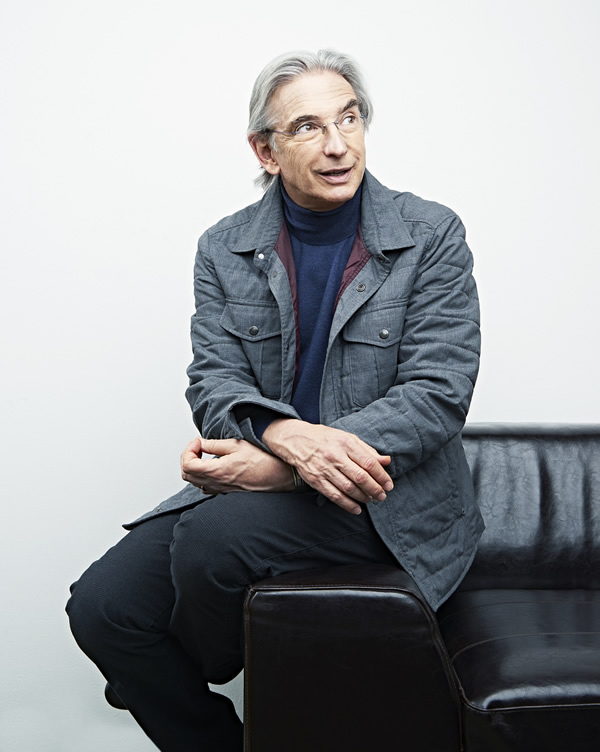
Michael Tilson Thomas (Photo by Spencer Lowell; courtesy San Francisco Symphony)
a&e features
Eastern Shore chef named James Beard Finalist
Harley Peet creates inventive food in an inclusive space

In a small Eastern Shore town filled with boutiques, galleries, and the occasional cry of waterfowl from the Chesapeake, Chef Harley Peet is most at home. In his Viennese-inflected, Maryland-sourced fine-dining destination Bas Rouge, Peet draws from his Northern Michigan upbringing, Culinary Institute of America education, and identity as a gay man, for inspiration.
And recently, Peet was named a James Beard Finalist for Best Chef: Mid-Atlantic – the first “Best Chef: Mid-Atlantic” finalist representing the Eastern Shore.
Peet, after graduation from the Culinary Institute of America, took a position as sous chef at Tilghman Island Inn, not far from Bas Rouge. Falling in love with the Eastern Shore, he continued his passion for racing sailboats, boating, gardening, and fishing, and living his somewhat pastoral life as he opened Bas Rouge in 2016 as head chef, a restaurant part of the Bluepoint Hospitality group, which runs more than a dozen concepts in and around Easton, Md.
Coming from a rural area and being gay, Peet knew he had his work cut out for him. He was always aware that the service and hospitality industry “can be down and dirty and rough.”
Now as a leader in the kitchen, he aims to “set a good example, and treat people how I want to be treated. I also want to make sure if you’re at our establishment, I’m the first to stand up and say something.”
The Bas Rouge cuisine, he says, is Contemporary European. “I’m inspired by old-world techniques of countries like Austria, Germany, and France, but I love putting a new spin on classic dishes and finding innovative ways to incorporate the bounty of local Chesapeake ingredients.”
His proudest dish: the humble-yet-elevated Wiener Schnitzel. “It is authentic to what one would expect to find in Vienna, down to the Lingonberries.” From his in-house bakery, Peet dries and grinds the housemade Kaiser-Semmel bread to use as the breadcrumbs.
Peet works to support the LGBTQ community inside and outside of the kitchen. “I love that our Bluepoint Hospitality team has created welcoming spaces where our patrons feel comfortable dining at each of our establishments. Our staff have a genuine respect for one another and work together free of judgment.”
Representing Bluepoint, Peet has participated in events like Chefs for Equality with the Human Rights Campaign, advocating for LGBTQ rights.
At Bas Rouge, Peet brings together his passion for inclusion steeped in a sustainability ethic. He sees environmental stewardship as a way of life. Peet and his husband have lived and worked on their own organic farm for several years. Through research in Europe, he learned about international marine sourcing. Witnessing the impacts of overfishing, Peet considers his own role in promoting eco-friendly practices at Bas Rouge. To that end, he ensures responsible sourcing commitments through his purveyors, relationships that have helped create significant change in how people dine in Easton.
“I have built great relationships in the community and there’s nothing better than one of our long-standing purveyors stopping in with a cooler of fresh fish from the Chesapeake Bay. This goes especially for catching and plating the invasive blue catfish species, which helps control the species’ threat to the local ecosystem.
Through his kitchen exploits, Peet expressed a unique connection to another gay icon in a rural fine-dining restaurant: Patrick O’Connell, of three Michelin starred Inn at Little Washington. In fact, Peet’s husband helped design some of O’Connell’s kitchen spaces. They’ve both been able to navigate treacherous restaurant-industry waters, and have come out triumphant and celebrated. Of O’Connell, Peet says that he “sees [his restaurants] as canvas, all artistry, he sees this as every night is a show.” But at the same time, his “judgment-free space makes him a role model.”
Being in Easton itself is not without challenges. Sourcing is a challenge, having to either fly or ship in ingredients, whereas urban restaurants have the benefit of trucking, he says. The small town “is romantic and charming,” but logistics are difficult – one of the reasons that Peet ensures his team is diverse, building in different viewpoints, and also “making things a hell of a lot more fun.”
Reflecting on challenges and finding (and creating) space on the Eastern Shore, Peet confirmed how important it was to surround himself with people who set a good example, and “if you don’t like the way something is going … move on.”
a&e features
What to expect at the 2024 National Cannabis Festival
Wu-Tang Clan to perform; policy discussions also planned

(Editor’s note: Tickets are still available for the National Cannabis Festival, with prices starting at $55 for one-day general admission on Friday through $190 for a two-day pass with early-entry access. The Washington Blade, one of the event’s sponsors, will host a LGBTQIA+ Lounge and moderate a panel discussion on Saturday with the Mayor’s Office of LGBTQ Affairs.)
With two full days of events and programs along with performances by Wu-Tang Clan, Redman, and Thundercat, the 2024 National Cannabis Festival will be bigger than ever this year.
Leading up to the festivities on Friday and Saturday at Washington, D.C.’s RFK Stadium are plenty of can’t-miss experiences planned for 420 Week, including the National Cannabis Policy Summit and an LGBTQ happy hour hosted by the District’s Black-owned queer bar, Thurst Lounge (both happening on Wednesday).
On Tuesday, the Blade caught up with NCF Founder and Executive Producer Caroline Phillips, principal at The High Street PR & Events, for a discussion about the event’s history and the pivotal political moment for cannabis legalization and drug policy reform both locally and nationally. Phillips also shared her thoughts about the role of LGBTQ activists in these movements and the through-line connecting issues of freedom and bodily autonomy.
After D.C. residents voted to approve Initiative 71 in the fall of 2014, she said, adults were permitted to share cannabis and grow the plant at home, while possession was decriminalized with the hope and expectation that fewer people would be incarcerated.
“When that happened, there was also an influx of really high-priced conferences that promised to connect people to big business opportunities so they could make millions in what they were calling the ‘green rush,'” Phillips said.
“At the time, I was working for Human Rights First,” a nonprofit that was, and is, engaged in “a lot of issues to do with world refugees and immigration in the United States” — so, “it was really interesting to me to see the overlap between drug policy reform and some of these other issues that I was working on,” Phillips said.
“And then it rubbed me a little bit the wrong way to hear about the ‘green rush’ before we’d heard about criminal justice reform around cannabis and before we’d heard about people being let out of jail for cannabis offenses.”
“As my interests grew, I realized that there was really a need for this conversation to happen in a larger way that allowed the larger community, the broader community, to learn about not just cannabis legalization, but to understand how it connects to our criminal justice system, to understand how it can really stimulate and benefit our economy, and to understand how it can become a wellness tool for so many people,” Phillips said.
“On top of all of that, as a minority in the cannabis space, it was important to me that this event and my work in the cannabis industry really amplified how we could create space for Black and Brown people to be stakeholders in this economy in a meaningful way.”

“Since I was already working in event production, I decided to use those skills and apply them to creating a cannabis event,” she said. “And in order to create an event that I thought could really give back to our community with ticket prices low enough for people to actually be able to attend, I thought a large-scale event would be good — and thus was born the cannabis festival.”
D.C. to see more regulated cannabis businesses ‘very soon’
Phillips said she believes decriminalization in D.C. has decreased the number of cannabis-related arrests in the city, but she noted arrests have, nevertheless, continued to disproportionately impact Black and Brown people.
“We’re at a really interesting crossroads for our city and for our cannabis community,” she said. In the eight years since Initiative 71 was passed, “We’ve had our licensed regulated cannabis dispensaries and cultivators who’ve been existing in a very red tape-heavy environment, a very tax heavy environment, and then we have the unregulated cannabis cultivators and cannabis dispensaries in the city” who operate via a “loophole” in the law “that allows the sharing of cannabis between adults who are over the age of 21.”
Many of the purveyors in the latter group, Phillips said, “are looking at trying to get into the legal space; so they’re trying to become regulated businesses in Washington, D.C.”
She noted the city will be “releasing 30 or so licenses in the next couple of weeks, and those stores should be coming online very soon” which will mean “you’ll be seeing a lot more of the regulated stores popping up in neighborhoods and hopefully a lot more opportunity for folks that are interested in leaving the unregulated space to be able to join the regulated marketplace.”
National push for de-scheduling cannabis
Signaling the political momentum for reforming cannabis and criminal justice laws, Wednesday’s Policy Summit will feature U.S. Sens. Raphael Warnock (D-Ga.), Jeff Merkley (D-Ore.), Elizabeth Warren (D-Mass.), and Chuck Schumer (D-N.Y.), the Senate majority leader.
Also representing Capitol Hill at the Summit will be U.S. Congresswoman Eleanor Holmes Norton (D-D.C.) and U.S. Reps. Earl Blumenauer (D-Ore.) and Barbara Lee (D-Calif.) — who will be receiving the Supernova Women Cannabis Champion Lifetime Achievement Award — along with an aide to U.S. Rep. David Joyce (R-Ohio).
Nationally, Phillips said much of the conversation around cannabis concerns de-scheduling. Even though 40 states and D.C. have legalized the drug for recreational and/or medical use, marijuana has been classified as a Schedule I substance since the Controlled Substances Act was passed in 1971, which means it carries the heftiest restrictions on, and penalties for, its possession, sale, distribution, and cultivation.
The U.S. Department of Health and Human Services formally requested the drug be reclassified as a Schedule III substance in August, which inaugurated an ongoing review, and in January a group of 12 Senate Democrats sent a letter to the Biden-Harris administration’s Drug Enforcement Administration urging the agency to de-schedule cannabis altogether.
Along with the Summit, Phillips noted that “a large contingent of advocates will be coming to Washington, D.C. this week to host a vigil at the White House and to be at the festival educating people” about these issues. She said NCF is working with the 420 Unity Coalition to push Congress and the Biden-Harris administration to “move straight to de-scheduling cannabis.”
“This would allow folks who have been locked up for cannabis offenses the chance to be released,” she said. “It would also allow medical patients greater access. It would also allow business owners the chance to exist without the specter of the federal government coming in and telling them what they’re doing is wrong and that they’re criminals.”
Phillips added, however, that de-scheduling cannabis will not “suddenly erase” the “generations and generations of systemic racism” in America’s financial institutions, business marketplace, and criminal justice system, nor the consequences that has wrought on Black and Brown communities.
An example of the work that remains, she said, is making sure “that all people are treated fairly by financial institutions so that they can get the funding for their businesses” to, hopefully, create not just another industry, but “really a better industry” that from the outset is focused on “equity” and “access.”
Policy wonks should be sure to visit the festival, too. “We have a really terrific lineup in our policy pavilion,” Phillips said. “A lot of our heavy hitters from our advocacy committee will be presenting programming.”
“On Saturday there is a really strong federal marijuana reform panel that is being led by Maritza Perez Medina from the Drug Policy Alliance,” she said. “So that’s going to be a terrific discussion” that will also feature “representation from the Veterans Cannabis Coalition.”
“We also have a really interesting talk being led by the Law Enforcement Action Partnership about conservatives, cops, and cannabis,” Phillips added.
Cannabis and the LGBTQ community
“I think what’s so interesting about LGBTQIA+ culture and the cannabis community are the parallels that we’ve seen in the movements towards legalization,” Phillips said.
The fight for LGBTQ rights over the years has often involved centering personal stories and personal experiences, she said. “And that really, I think, began to resonate, the more that we talked about it openly in society; the more it was something that we started to see on television; the more it became a topic in youth development and making sure that we’re raising healthy children.”
Likewise, Phillips said, “we’ve seen cannabis become more of a conversation in mainstream culture. We’ve heard the stories of people who’ve had veterans in their families that have used cannabis instead of pharmaceuticals, the friends or family members who’ve had cancer that have turned to CBD or THC so they could sleep, so they could eat so they could get some level of relief.”
Stories about cannabis have also included accounts of folks who were “arrested when they were young” or “the family member who’s still locked up,” she said, just as stories about LGBTQ people have often involved unjust and unnecessary suffering.
Not only are there similarities in the socio-political struggles, Phillips said, but LGBTQ people have played a central role pushing for cannabis legalization and, in fact, in ushering in the movement by “advocating for HIV patients in California to be able to access cannabis’s medicine.”
As a result of the queer community’s involvement, she said, “the foundation of cannabis legalization is truly patient access and criminal justice reform.”
“LGBTQIA+ advocates and cannabis advocates have managed to rein in support of the majority of Americans for the issues that they find important,” Phillips said, even if, unfortunately, other movements for bodily autonomy like those concerning issues of reproductive justice “don’t see that same support.”
a&e features
Juliet Hawkins’s music defies conventional categorization
‘Keep an open mind, an open heart, and a willingness to evolve’
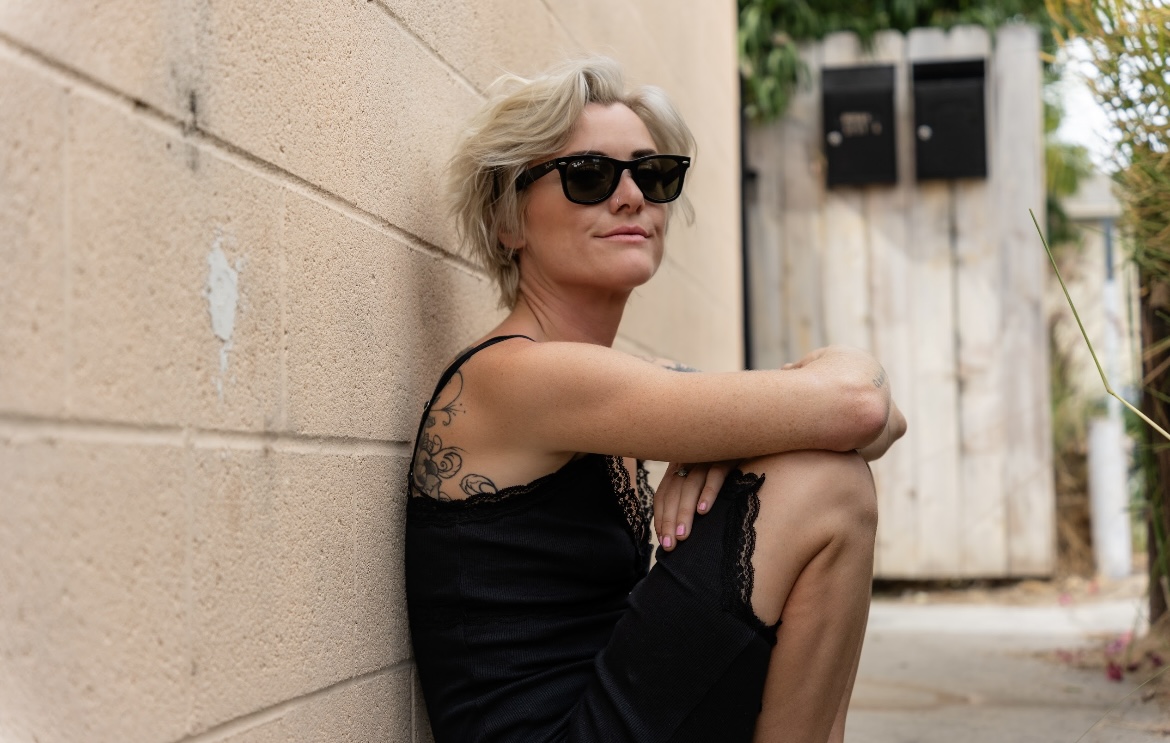
LONG BEACH, Calif. – Emerging from the dynamic music scene of Los Angeles, Juliet Hawkins seamlessly integrates deeply soulful vocals with contemporary production techniques, crafting a distinctive sound that defies conventional categorization.
Drawing inspiration from the emotive depth of Amy Winehouse and weaving together elements of country, blues, and pop, Hawkins’ music can best be described as a fusion–perhaps best termed as soulful electronica. Yet, even this characterization falls short, as Hawkins defines herself as “a blend of a million different inspirations.”
Hawkins’s musical palette mirrors her personae: versatile and eclectic. Any conversation with Hawkins makes this point abundantly clear. She exhibits the archetype of a wild, musical genius while remaining true to her nature-loving, creative spirit. Whether recording in the studio for an album release, performing live in a studio setting, or playing in front of a live audience, Hawkins delivers her music with natural grace.
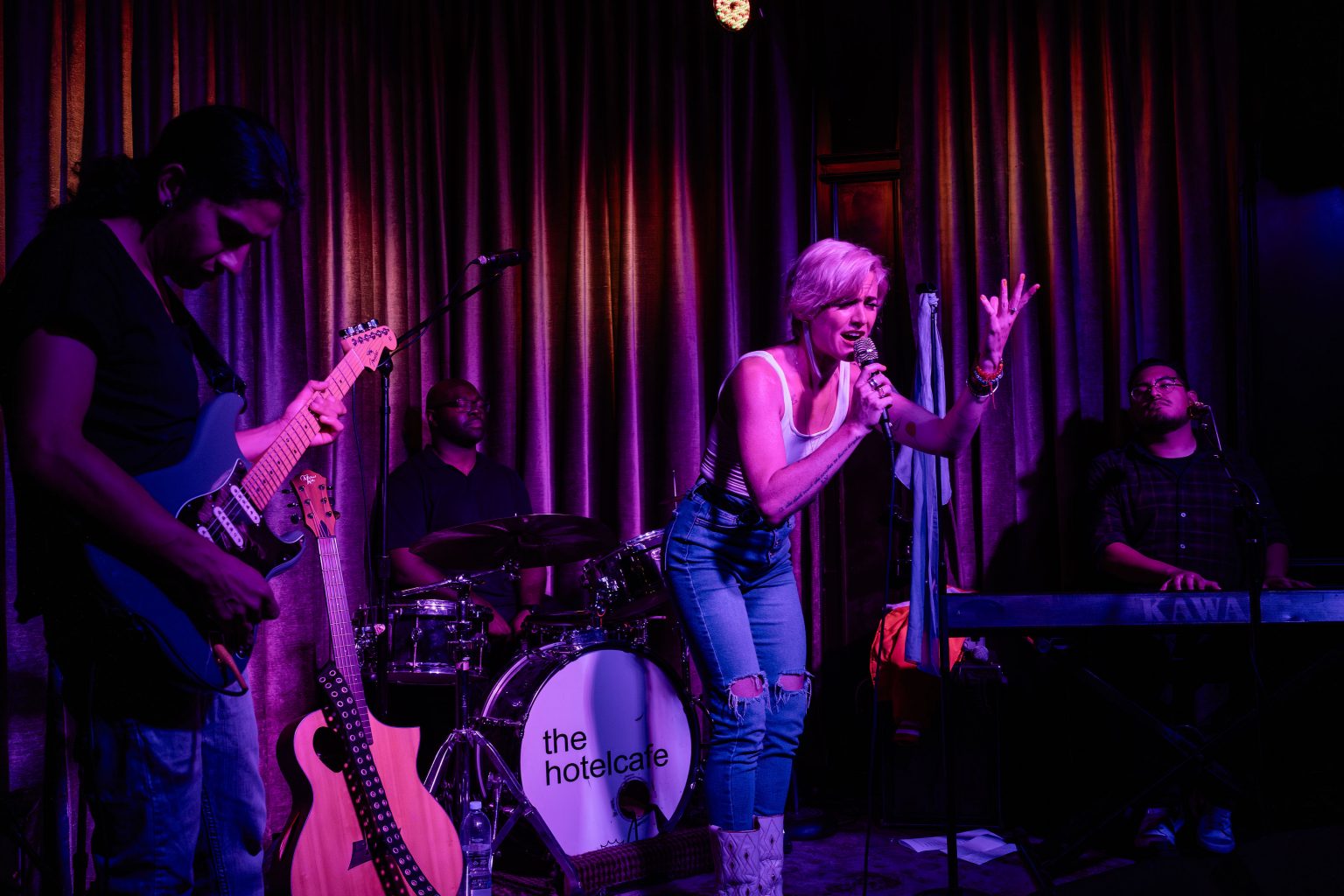
However, Hawkins’s musical journey is far from effortless. Amid personal challenges and adversity, she weaves her personal odyssey of pain and pleasure, transforming these experiences into empowering anthems.
In a candid interview with the Blade, Hawkins spoke with profound openness and vulnerability about her past struggles with opiate and heroin addiction: “That was 10 years ago that I struggled with opiates,” she shared. Yet, instead of letting her previous addiction define her, Hawkins expressed to the Blade that she harbors no shame about her past. “My newer music is much more about empowerment than recovery,” she explained, emphasizing that “writing was the best way to process trauma.”
Despite her struggles with addiction, Hawkins managed to recover. However, she emphasizes that this recovery is deeply intertwined with her spiritual connection to nature. An illustrative instance of Hawkins’ engagement with nature occurred during the COVID pandemic.
Following an impulse that many of us have entertained, she bought a van and chose to live amidst the trees. It was during this period that Hawkins composed the music for her second EP, titled “Lead with Love.”
In many ways, Hawkins deep spiritual connection to nature has been profoundly shaped by her extensive travels. Born in San Diego, spending her formative years in Massachusetts, and later moving to Tennessee before returning to Southern California, she has broadened her interests and exposed herself to the diverse musical landscapes across America.
“Music is the only thing I have left,” Hawkins confides to the Blade, highlighting the integral role that music has in her life. This intimate relationship with music is evident in her sultry and dynamic compositions. Rather than imitating or copying other artists, Hawkins effortlessly integrates sounds from some of her favorite musical influences to create something new. Some of these influences include LP, Lucinda Williams, Lana Del Rey, and, of course, Amy Winehouse, among others.
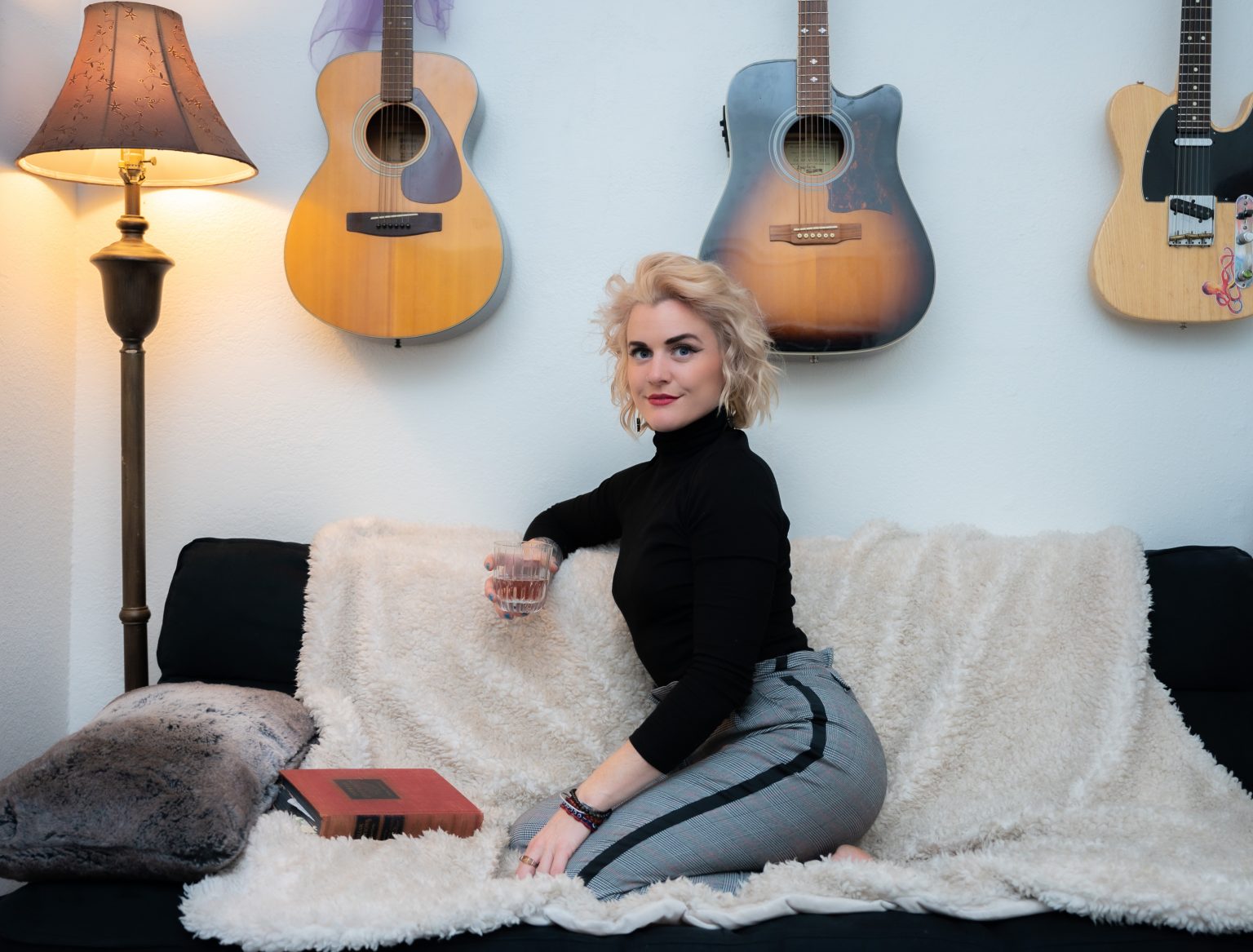
Hawkins has always been passionate about music—-she began with piano at a young age, progressed to guitar, and then to bass, eagerly exploring any instrument she could get her hands on. However, instead of following a traditional path of formalized lessons and structured music theory, Hawkins told the Blade that she “has a hard time following directions and being told what to do.”
This independent approach has led her to experiment with various genres and even join unexpected groups, such as a tribute band for Eric Clapton and Cream. While she acknowledges that her eclectic musical interests might be attributed to ADHD, she holds a different belief: “Creative minds like to move around.”
When discussing her latest musical release — “Stay True (the live album)” which was recorded in a live studio setting — Hawkins describes the experience as a form of improvisation with both herself and the band:
“[The experience] was this divine honey that was flowing through all of us.” She explains that this live album was uncertain in the music’s direction. “For a couple of songs,” Hawkins recalls, “we intuitively closed them out.” By embracing creative spontaneity and refusing to be constrained by fear of mistakes, the live album authentically captures raw sound, complete with background chatter, extended outros, and an extremely somber cover of Ozzy Osbourne’s “Crazy Train” coupled with a slow piano and accompanied strings.
While “Stay True” was a rewarding experience for Hawkins, her favorite live performance took place in an unexpected location—an unattended piano in the middle of an airport. As she began playing Beethoven’s “Moonlight Sonata”, Hawkins shared with the Blade a universal connection we all share with music: “This little girl was dancing as I was playing.”
After the performance, tears welled in Hawkins’ eyes as she was touched by the young girl’s appreciation of her musicianship. Hawkins tells the Blade, “It’s not about playing to an audience—it’s about finding your people.”
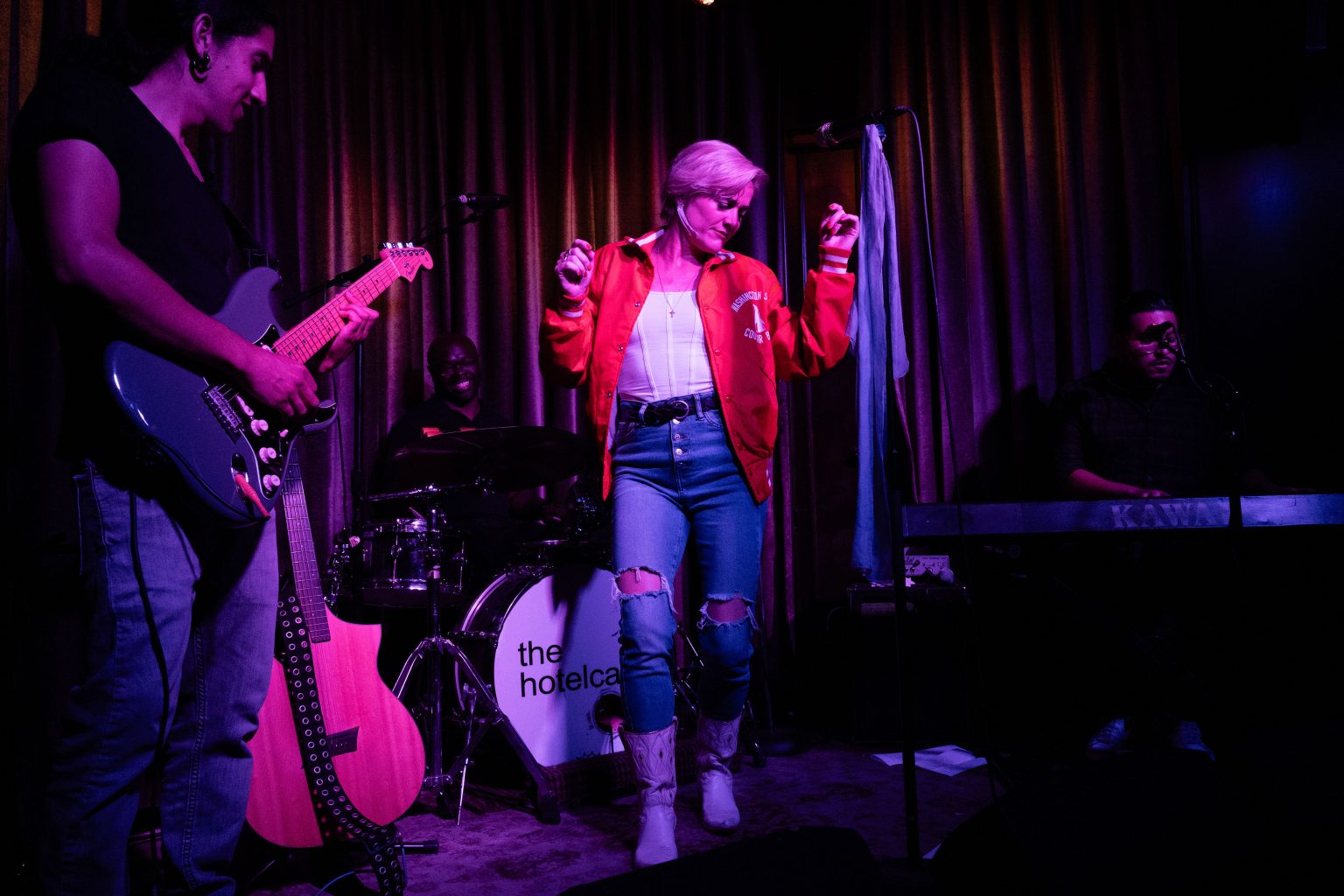
What sets Hawkins apart as an artist is her ability to connect with her audience in diverse settings. She highlights EDC, an electronic dance music festival, as a place where she unabashedly lets her “freak flag” fly and a place to connect with her people. Her affinity for electronic music not only fuels her original pop music creations, but also inspires her to reinterpret songs with an electronic twist. A prime example of this is with her electronic-style cover of Tal Bachman’s 90’s hit, “She’s So High.”
As an openly queer woman in the music industry, Hawkins is on a mission to safeguard artistic integrity. In songs like “My Father’s Men,” she bares her vulnerability and highlights the industry’s misogyny, which often marginalizes gender minorities in their pursuit of artistic expression.
She confides to the Blade, “The industry can be so sexist, misogynist, and oppressive,” and points out that “there are predators in the industry.” Yet, rather than succumbing to apathy, Hawkins is committed to advocating for gender minorities within the music industry.
“Luckily, people are rising up against misogyny, but it’s still there. ‘My Father’s Men’ is a message: It’s time for more people who aren’t just white straight men to have a say.”
Hawkins is also an activist for other causes, with a fervent belief in the preservation of bodily autonomy. Her self-directed music video “I’ll play Daddy,” showcases the joy of embracing one’s body with Hawkins being sensually touched by a plethora of hands. While the song, according to Hawkins, “fell upon deaf ears in the south,” it hasn’t stopped Hawkins from continuing to fight for the causes she believes in. In her interview, Hawkins encapsulated her political stance by quoting an artist she admires:
“To quote Pink, ‘I don’t care about your politics, I care about your kids.’”
When Hawkins isn’t writing music or being a champion for various causes, you might catch her doing the following: camping, rollerblading, painting, teaching music lessons, relaxing with Bernie (her beloved dog), stripping down for artsy photoshoots, or embarking on a quest to find the world’s best hollandaise sauce.
But at the end of the day, Hawkins sums up her main purpose: “To come together with like-minded people and create.”
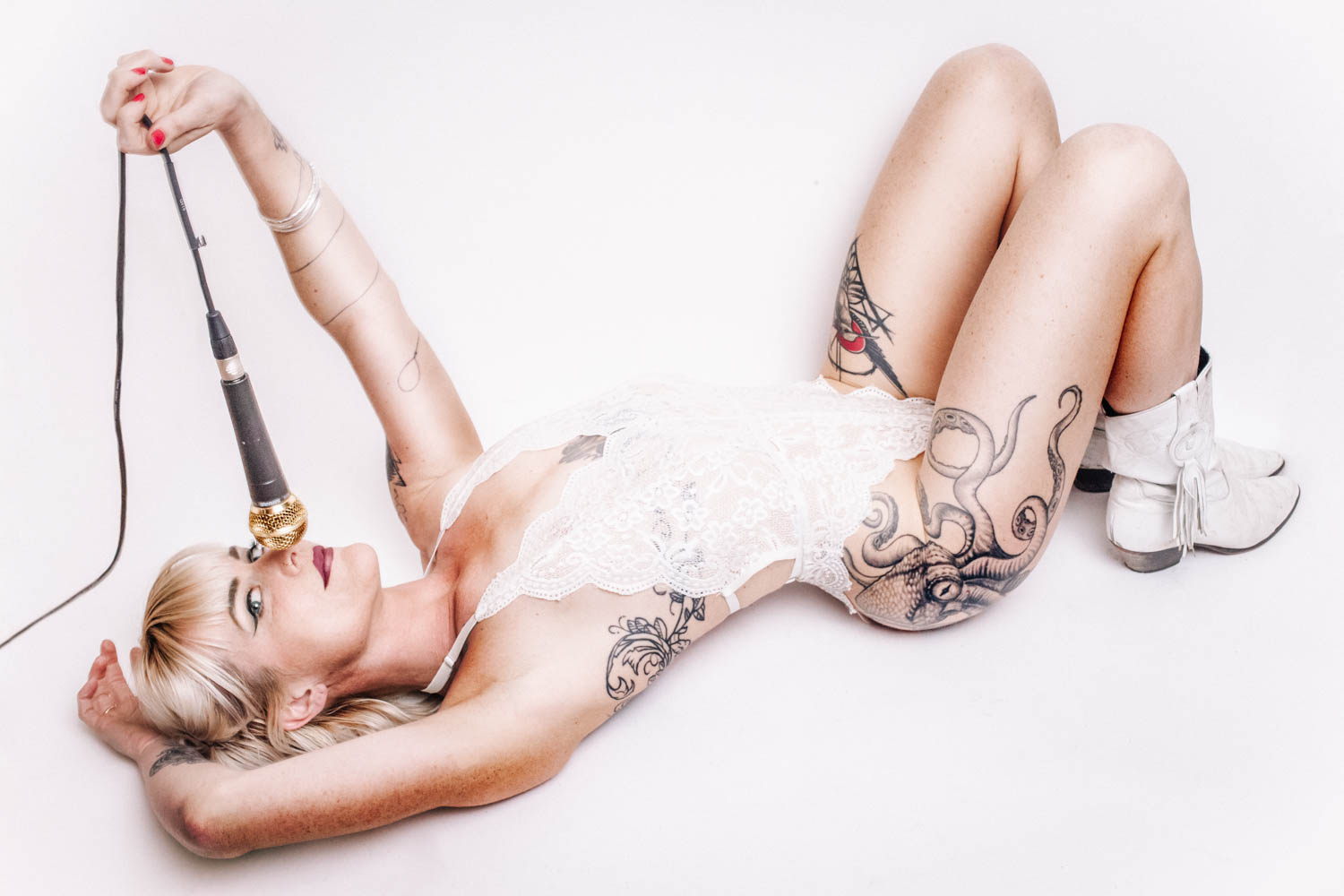
Part of this ever-evolving, coming-of-age-like journey includes an important element: plant-based medicine. Hawkins tells the Blade that she acknowledges her previous experience with addiction and finds certain plants to be useful in her recovery:
“The recovery thing is tricky,” Hawkins explains, “I don’t use opiates—-no powders and no pills—but I am a fan of weed, and I think psilocybin can be helpful when used at the right time.” She emphasizes the role of psychedelics in guiding her towards her purpose. “Thanks for psychedelics, I have a reignited sense of purpose … Music came naturally to me as an outlet to heal.”
While she views the occasional dabbling of psychedelics as a spiritual practice, Hawkins also embraces other rituals, particularly those she performs before and during live shows. “I always carry two rocks with me: a labradorite and a tiger’s eye marble,” she explains.
-

 State Department3 days ago
State Department3 days agoState Department releases annual human rights report
-

 South America1 day ago
South America1 day agoArgentina government dismisses transgender public sector employees
-

 Maryland5 days ago
Maryland5 days agoJoe Vogel campaign holds ‘Big Gay Canvass Kickoff’
-

 District of Columbia1 day ago
District of Columbia1 day agoCatching up with the asexuals and aromantics of D.C.





